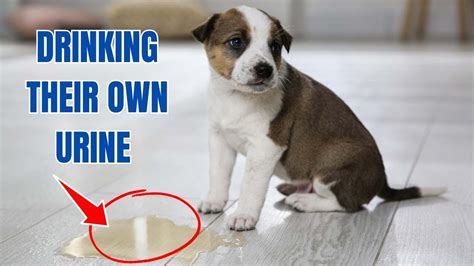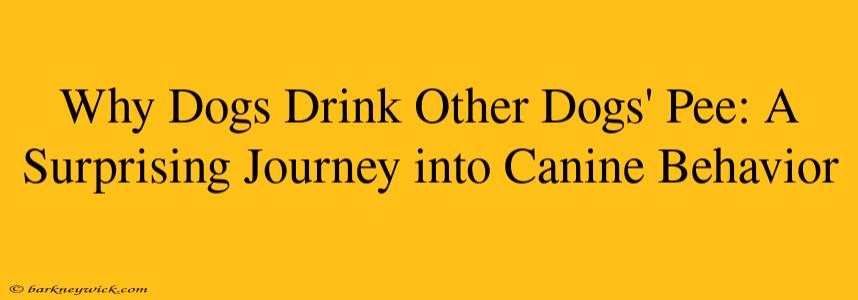Discover why dogs drink other dogs' pee, the science behind this behavior, and expert tips to manage it. Learn from real experiences and veterinary insights.
As a dog owner, I've witnessed my fair share of quirky canine behaviors, but nothing quite prepared me for the day I caught my 4-year-old Pomchi, Max, lapping up our senior Labrador's urine. It was a moment of shock, disgust, and utter bewilderment. Little did I know that this seemingly gross habit would lead me down a fascinating path of discovery about dog behavior and communication.
The Unexpected Urine Connoisseur
It all started on a lazy Sunday afternoon. I was lounging in our backyard, enjoying the warm sun and the sight of our four dogs playing together. Our oldest, Luna, a 12-year-old Labrador who's been showing signs of senility, suddenly squatted and relieved herself on the grass. Before I could even reach for the poop bag, Max darted over and began licking the puddle with gusto.
My initial reaction was a mix of horror and concern. Was Max sick? Was he dehydrated? Or was this some bizarre form of canine affection? As I watched this scene unfold, I realized I needed to understand why my otherwise well-behaved pup was engaging in such an unsavory act.
The Science Behind the Slurp
After my initial shock wore off, I delved into research and consulted with our veterinarian, Dr. Sarah Thompson at Pawsome Pet Clinic. What I learned was both fascinating and eye-opening.
Olfactory Exploration: A Dog's Superpower
Dogs, it turns out, have an incredible sense of smell that puts our human noses to shame. Their olfactory abilities are up to 100,000 times more sensitive than ours. This superpower isn't just for sniffing out treats or detecting danger; it's a crucial tool for gathering information about their environment and other animals.
Dr. Thompson explained, "When a dog licks another dog's urine, they're essentially 'reading' a complex chemical message. Urine contains pheromones and other compounds that reveal a wealth of information about the dog who produced it – their sex, health status, diet, and even emotional state."
Social Networking: Canine Style
In the dog world, urine isn't just waste; it's a social networking tool. By licking another dog's urine, Max was engaging in a form of canine social media, gathering the latest updates about Luna's health and status within our little pack.

The Urine Diaries: More Common Than You Think
As I shared my experience with other dog owners, I was surprised to learn how common this behavior is. According to a survey conducted by the American Kennel Club, approximately 32% of dog owners have observed their pets licking or drinking other dogs' urine at least once.
This statistic was both reassuring and concerning. On one hand, I was relieved to know that Max wasn't alone in his peculiar habit. On the other hand, it raised questions about potential health risks.
Health Implications: When Curiosity Becomes Concern
While urine licking is generally a normal behavior for dogs, it's not without its risks. Dr. Thompson cautioned, "There's always a potential for disease transmission, especially if the dog whose urine is being consumed is ill. Leptospirosis, a bacterial infection, can be spread through urine and can cause serious health issues in dogs."
A study published in the Journal of Veterinary Internal Medicine found that dogs who frequently engage in urine licking have a 1.5 times higher risk of contracting urinary tract infections compared to those who don't. This statistic underscores the importance of monitoring and managing this behavior.
Managing the Behavior: From Prevention to Training
As a responsible pet owner, I knew I needed to take steps to manage Max's urine-drinking habit. Here are some strategies I've implemented, based on advice from Dr. Thompson and my own research:
-
Prompt Clean-Up: I now make it a point to clean up any indoor accidents immediately. This reduces the opportunity for Max to engage in urine licking.
-
Distraction Techniques: When I see Max approaching another dog's urine, I quickly distract him with a toy or treat. This helps redirect his attention to more appropriate activities.
-
Positive Reinforcement: I praise and reward Max when he ignores urine puddles or responds to my distraction attempts. This reinforces the behavior I want to see.
-
Increased Supervision: I keep a closer eye on the dogs during outdoor time, especially when Luna is around, as Max seems particularly interested in her urine.
-
Regular Vet Check-ups: I've scheduled more frequent check-ups for all our dogs to ensure any potential health issues are caught early.
The Role of the American Veterinary Medical Association (AVMA)
In my quest for information, I turned to the American Veterinary Medical Association (AVMA), a leading authority on animal health and behavior. The AVMA provides valuable resources for pet owners dealing with various behavioral issues, including urine licking.
Dr. John Howe, former president of the AVMA, emphasizes the importance of understanding normal canine behaviors. "What might seem gross or inappropriate to us humans is often perfectly natural in the dog world," he explains. "Our role as pet owners is to ensure these behaviors don't pose health risks and to guide our pets towards more socially acceptable alternatives."
The AVMA recommends consulting with a veterinary behaviorist if the urine-drinking behavior becomes excessive or if it's accompanied by other concerning symptoms. They also stress the importance of regular veterinary check-ups to monitor overall health and address any underlying issues that might be contributing to the behavior.
A New Perspective on Canine Communication
As I reflect on this journey of discovery, I'm struck by how much I've learned about canine behavior and communication. What started as a moment of disgust has transformed into a deeper appreciation for the complex world of dog social interactions.
Max's urine-drinking habit, while still not my favorite of his behaviors, no longer fills me with horror. Instead, it's a reminder of the fascinating and sometimes mysterious ways our canine companions perceive and interact with their world.
For other dog owners facing similar situations, remember that understanding is the first step towards effective management. Don't be afraid to consult with your veterinarian, and remember that what seems strange to us might be perfectly normal in the dog world.
As for Max and Luna, they continue their friendship, blissfully unaware of the behavioral study they've inspired. And me? I'm just grateful for the opportunity to learn and grow alongside my furry family members, urine-drinking habits and all.
: https://www.akc.org/expert-advice/lifestyle/dog-sense-of-smell/ : https://www.akc.org/expert-advice/health/why-dogs-drink-urine/ : https://onlinelibrary.wiley.com/doi/full/10.1111/jvim.15833
